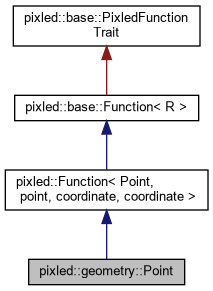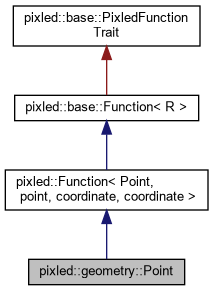#include <geometry.h>
Inheritance diagram for pixled::geometry::Point:

Collaboration diagram for pixled::geometry::Point:

Public Member Functions | |
| point | operator() (led l, time t) const override |
 Public Member Functions inherited from pixled::Function< Point, point, coordinate, coordinate > Public Member Functions inherited from pixled::Function< Point, point, coordinate, coordinate > | |
| Function (Fcts &&... fcts) | |
| const base::Function< typename std::tuple_element< i, decltype(args)>::type::Type > & | arg () const |
| std::tuple_element< i, decltype(args)>::type::Type | call (led l, time t) const |
Additional Inherited Members | |
 Public Types inherited from pixled::Function< Point, point, coordinate, coordinate > Public Types inherited from pixled::Function< Point, point, coordinate, coordinate > | |
| using | Type = typename base::Function< point >::Type |
 Public Types inherited from pixled::base::Function< R > Public Types inherited from pixled::base::Function< R > | |
| typedef R | Type |
 Protected Member Functions inherited from pixled::Function< Point, point, coordinate, coordinate > Protected Member Functions inherited from pixled::Function< Point, point, coordinate, coordinate > | |
| base::Function< point > * | copy () const override |
 Protected Attributes inherited from pixled::Function< Point, point, coordinate, coordinate > Protected Attributes inherited from pixled::Function< Point, point, coordinate, coordinate > | |
| std::tuple< const FctWrapper< Args >... > | args |
Detailed Description
Functionnal point definition.
Notice the difference with pixled::point, that is a fundamental type, returned by this Point Function.
Contrary to pixled::point, a Point is defined from two dynamic Functions that return X/Y coordinates.
- Return values
-
point the pixled::point defined by X/Y
Member Function Documentation
◆ operator()()
Computes the value of this Function for led l at time t.
- Parameters
-
l led t time
- Returns
- Result of this Function, evaluated on led
lat timet. Notice that evaluating a function usually requires the recursive evaluation of other Functions (that are actually parameters of this function) until a Constant is reached for example.
Implements pixled::base::Function< R >.
The documentation for this class was generated from the following files:
- src/pixled/geometry/geometry.h
- src/pixled/geometry/geometry.cpp